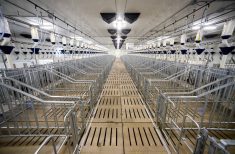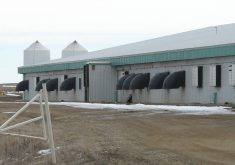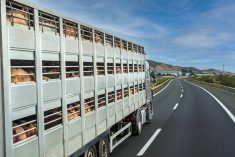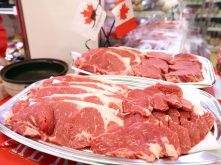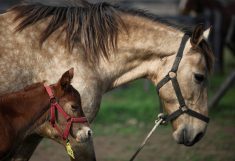A mild virus masquerading as a more serious disease caused frustration in the hog sector this summer, but it could have been much worse, Manitoba producers heard during an early November meeting of the Manitoba Pork Council.
Earlier this year, American authorities started requiring a veterinary export certificate for certain cull sows coming out of Manitoba, following a rise in Seneca Valley virus cases at U.S. packing plants, said Jenelle Hamblin, Manitoba Pork’s director of swine health.
Why it matters: The relatively low-impact Seneca Valley virus mimics diseases that would have serious trade and animal health implications.
Read Also

Pragmatism prevails for farmers in Canada-China trade talks
Canada’s trade concessions from China is a good news story for Canadian farmers, even if the U.S. Trump administration may not like it.
Seneca Valley virus does not have serious veterinary implications, but it shares symptoms with much more worrisome illnesses like foot and mouth disease. If animals arrive at processing sites with these symptoms, an investigation is triggered to rule out the weightier diseases, Hamblin said.
Starting in September, all sows from one assembly yard in Manitoba had to be inspected and signed off by a veterinarian before they could cross the border, but finding a veterinarian to come out regularly was a challenge due to biosecurity issues. There was a temporary shipping pause as those logistics were ironed out, Hamblin said.
While the policy impacted one site, Manitoba Pork became concerned that the certification requirement would be widely applied to assembly yards. If it had, Hamblin said, export of cull sows would have ground to a halt due to the resources required to inspect and certify the operations.
Hamblin said she’s “cautiously optimistic” that the requirement won’t be expanded to more yards.
“We have not heard of [Seneca Valley virus] cases recently, but that doesn’t mean that we need to stop being diligent.”
Those at the affected yard are working with authorities to determine a timeline for removal of the requirement, Hamblin added.
Last summer, the U.S. Animal and Plant Health Inspection Service halted shipments from two Manitoba assembly yards for about a week due to the virus.
At the time, Manitoba Pork told the Co-operator that industry protocols were in place to control the virus and get trade back on track. Manitoba Pork, the Canadian Food Inspection Agency and provincial veterinary authorities worked with shippers and their American customers on the strategy.
Hamblin advised producers to maintain a high level of biosecurity while shipping, particularly at assembly yards and abattoirs. She also urged them to speak to a veterinarian on Seneca Valley virus symptoms to watch for and to avoid animals that exhibited any of those signs.






